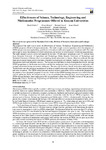Effectiveness of Science, Technology, Engineering and Mathematics Programmes Offered in Kenyan Universities

View/
Date
2020Author
Mulwa, David
Kiweu, Mboya
Kimiti, Richard
Muola, James
Kinyili, Jacinta
Muriungi, Pamela
Metadata
Show full item recordAbstract
The purpose of the study was to assess the effectiveness of Science, Technology, Engineering and Mathematics
(STEM) programs offered in Kenyan universities. The study sought to answer questions about the adequacy of
STEM programmes training facilities, qualification of academic staff and competency of academic staff. The study
also sought to assess the adequacy of STEM curriculum, and the level of achievement of STEM learning outcomes.
The study adopted a census survey and targeted 66 lecturers, 59 laboratory technologists and 275 students from
Jomo Kenyatta University of Agriculture and Technology, Dedan Kimathi University of Technology and
Technical University of Kenya which are technology-based universities in Kenya. Data was collected through
three sets of questionnaires each for lecturers, laboratory technologists and students. Analysis of the data was done
through descriptive and inferential statistics. The findings were that there was lack of adequate facilities for training
STEM programmes in the Kenyan universities and that the inadequacy varies from university to university with
younger universities having the severest inadequacy. The study also found out that all the lecturers and Laboratory
Technologists met the minimum requirements in terms of qualification and experience for their responsibilities
and were competent. The STEM curriculum and practical sessions were either well or satisfactorily prepared and
the graduates were adequately prepared. It was also found out that STEM learning outcomes were achieved by the
time of graduation. From the research results, it can be concluded that although there were inadequacies in the
STEM training facilities, these inadequacies did not significantly affect the overall effectiveness of the programs
Collections
- School of Education [203]
